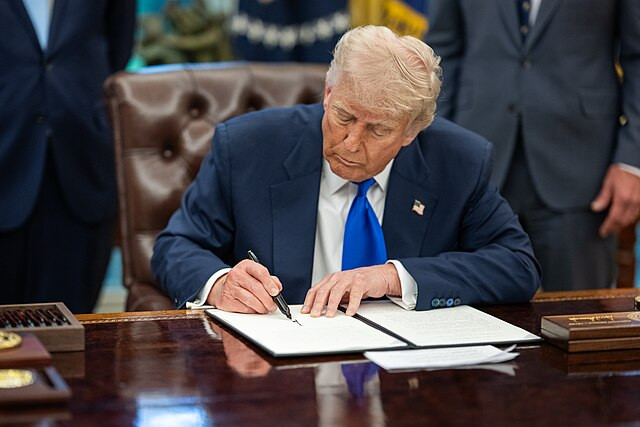Congress narrowly passed President Donald Trump's sweeping tax and spending bill Thursday, marking the first major legislative win of his second term and reshaping federal fiscal policy along sharply partisan lines. The bill passed the House 218-214 after months of intra-GOP negotiations, with Democrats uniformly opposed.
The legislation fulfills key pillars of Trump's 2024 campaign: making permanent the 2017 tax cuts, enacting new tax breaks on tips and overtime, slashing safety net programs, and intensifying immigration enforcement. The final package also includes $50 billion for a border wall and $45 billion to expand Immigration and Customs Enforcement detention facilities.
"We've waited long enough, some of us have literally been up for days now," said House Speaker Mike Johnson. "With one big, beautiful bill, we are going to make this country stronger, safer and more prosperous than ever before."
Trump's influence was evident throughout the legislative process. Despite deep divisions within the GOP on spending levels, green energy incentives, and Medicaid reforms, the president's private meetings, public threats, and social media pressure helped consolidate support. "It would have never happened without Donald Trump," said Rep. Ralph Norman (R., S.C.).
Two Republicans, Reps. Thomas Massie (Ky.) and Brian Fitzpatrick (Pa.), broke ranks. Massie warned the bill would "significantly increase U.S. budget deficits," while Fitzpatrick cited concerns over Senate amendments to Medicaid.
The Congressional Budget Office projects the bill will add $3.3 trillion to the federal deficit over the next decade. Democrats condemned the package as a windfall for the wealthy funded by cuts to essential services. "This assault on everyday Americans... is being unleashed on the American people, Mr Speaker, on the most vulnerable among us, all of this is being done to provide massive tax breaks to billionaire donors," House Minority Leader Hakeem Jeffries said during an 8-hour, 44-minute floor speech, a record-setting filibuster effort.
The bill's Medicaid cuts could strip up to 11.8 million people of healthcare, while 8 million SNAP recipients are expected to lose benefits. The legislation also imposes work requirements and forces states to shoulder new financial burdens for food assistance.
Even conservative hardliners who initially balked at the bill's cost relented after direct appeals from Trump. Rep. Andy Harris (R., Md.), chair of the House Freedom Caucus, said: "The agreement is with the president. If you want to know, ask the president."
In the Senate, the bill passed by a 51-50 margin with Vice President J.D. Vance casting the tie-breaking vote. Speaker Johnson managed to deliver the legislation ahead of Trump's self-imposed July 4 deadline.
The bill repeals Biden-era green energy tax credits and redirects billions toward fossil fuel development, prompting environmental groups to accuse Republicans of accelerating climate risk. Meanwhile, a $50 billion rural hospital stabilization fund was added to blunt backlash over provider tax reforms and Medicaid cuts.
Democrats, branding the legislation the "big, ugly bill," intend to use it as a centerpiece of their 2026 midterm campaign strategy. "People will die," Jeffries warned, referencing the scope of Medicaid reductions.






